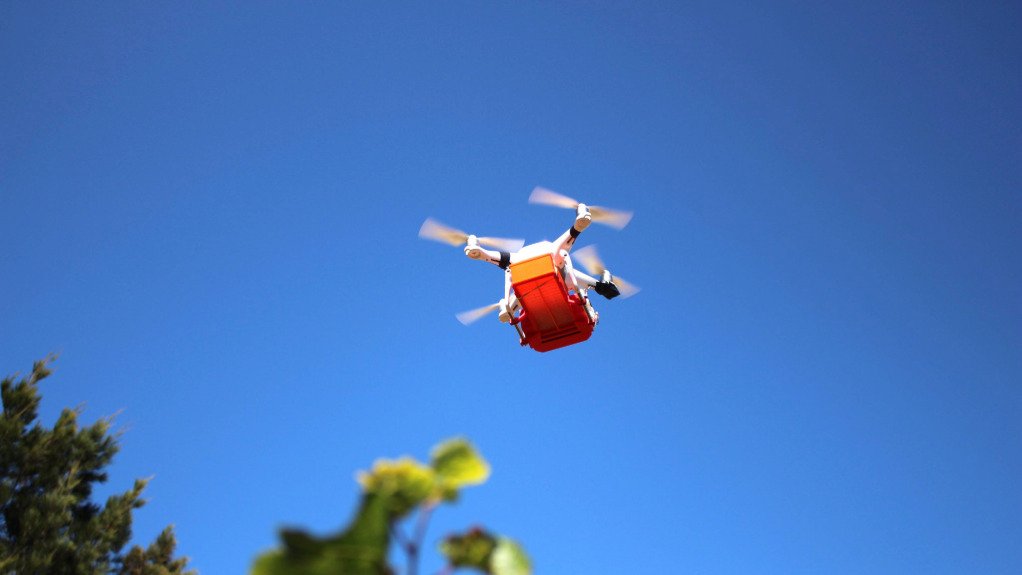Drones deliver predator bugs for sustainable pest control


REACHING NEW HEIGHTS Drone dispersal ensures more effective distribution and coverage of beneficial insects
Wine producer Vergelegen wine estate, in Somerset West, has partnered with collaborative venture SkyBugs to test the use of drone-delivered beneficial insects to control pests in its vineyards.
SkyBugs, a partnership between integrated pest management provider FieldBUGS and agritech company Aerobotics, employs a network of skilled drone pilots to accurately disperse the insects.
Vergelegen is hopeful that introducing beneficial insects will result in less vine disease and higher quality grapes, ensuring that its winemakers can continue to produce high-quality wine.
The vineyards are currently between 20 and 25 years old and are valuable assets as their fruit gets better over time, says Vergelegen.
SkyBugs conducted its first drone dispersal at the Vergelegen wine estate in October last year. The company aims to complete a total of five dispersals, depending on initial test results, in the first quarter of 2024, with about 130 ha of vineyards receiving beneficial insects through drones.
The first stage of the programme involved scouting and data assessment, says FieldBUGS technical support specialist Ruan Erasmus, elaborating that the actual method of insect release involves flying a drone 30 m above a vineyard block.
The drone uses a motor-driven mechanism equipped with a cartridge and a drawn-out plastic film to release the insects on to the vines. Each flight covers up to 20 ha, after which the drone lands and a new battery, as well as a cartridge of insects, are inserted.
The insects are dispersed while in the pupa life stage – between immature and mature insect – and hatch after several days, depending on the weather.
The insects are dispersed to target mealybugs, which spread the leaf roll virus. The virus causes grape leafroll disease and affects red and white wine cultivars by diminishing the quality and volume of the harvest. As a result, the vines become uneconomical and must be uprooted.
Vergelegen uses predatory Anagyrus Vladimiri and Coccidoxenoides Perminutus wasps as well as Cryptolaemus Montrouzieri ladybug beetles which are indigenous to South Africa. The first stage involves distributing predatory which are attracted by a pheromone released by female mealybugs. This proactive measure is supplemented with the selective distribution of ladybugs, which can eat 100 to 200 mealybugs daily.
FieldBUGS sources the predators used at Vergelegen from insectaries in Piketberg, in the Western Cape, and Tzaneen, in Limpopo.
Taking Pest Control to New Heights
South African farmers are advanced in harnessing data to assess and manage risk, Erasmus says, noting that there is growing interest in biological control of pests, especially in the Western Cape which produces about 80% to 85% of South African fruit exports.
Farmers want to improve their yields, and avoid chemical residue on fruit, to meet strict European and Fairtrade environmental standards, he explains.
Erasmus advises that farmers consider drone dispersal of insects, which should cover a minimum of 50 ha. Costs range from R650/ha to R1 500/ha, which includes scouting, insect release, technical support and reporting.
In addition to vineyards, beneficial insects can also be used by producers of citrus, dates, apples, macadamias, avocados, pears, blueberries, cannabis, strawberries and various vegetable crops.
Through drone dispersal, farmers are able to ensure more effective distribution and coverage of beneficial insects as opposed to traditionally dispersal, which entails the use of compostable tubes of insects that are hung in vines.
Further, predatory wasps fly no more than 90 m daily, therefore, drone dispersal improves the likelihood of the wasps locating mealybugs. Beneficial insects can also be released onto high trees near vineyards, where mealybugs normally escape detection.
Additionally, the use of insect pupa on plastic film saves the cost of tube packaging and offers better value for money.
“Vergelegen is one of our largest clients and it has been exciting to work with them, in a programme that has provided good proof of concept for using this method of drone-delivered beneficial insects. The estate has been most receptive to using technology in their quest for pest-free vineyards using natural methods,” says Aerobotics mapping operations head Matt Davis.
“One can never completely eradicate mealybugs, but it is possible to control them,” Erasmus concludes.
Comments
Press Office
Announcements
What's On
Subscribe to improve your user experience...
Option 1 (equivalent of R125 a month):
Receive a weekly copy of Creamer Media's Engineering News & Mining Weekly magazine
(print copy for those in South Africa and e-magazine for those outside of South Africa)
Receive daily email newsletters
Access to full search results
Access archive of magazine back copies
Access to Projects in Progress
Access to ONE Research Report of your choice in PDF format
Option 2 (equivalent of R375 a month):
All benefits from Option 1
PLUS
Access to Creamer Media's Research Channel Africa for ALL Research Reports, in PDF format, on various industrial and mining sectors
including Electricity; Water; Energy Transition; Hydrogen; Roads, Rail and Ports; Coal; Gold; Platinum; Battery Metals; etc.
Already a subscriber?
Forgotten your password?
Receive weekly copy of Creamer Media's Engineering News & Mining Weekly magazine (print copy for those in South Africa and e-magazine for those outside of South Africa)
➕
Recieve daily email newsletters
➕
Access to full search results
➕
Access archive of magazine back copies
➕
Access to Projects in Progress
➕
Access to ONE Research Report of your choice in PDF format
RESEARCH CHANNEL AFRICA
R4500 (equivalent of R375 a month)
SUBSCRIBEAll benefits from Option 1
➕
Access to Creamer Media's Research Channel Africa for ALL Research Reports on various industrial and mining sectors, in PDF format, including on:
Electricity
➕
Water
➕
Energy Transition
➕
Hydrogen
➕
Roads, Rail and Ports
➕
Coal
➕
Gold
➕
Platinum
➕
Battery Metals
➕
etc.
Receive all benefits from Option 1 or Option 2 delivered to numerous people at your company
➕
Multiple User names and Passwords for simultaneous log-ins
➕
Intranet integration access to all in your organisation


















